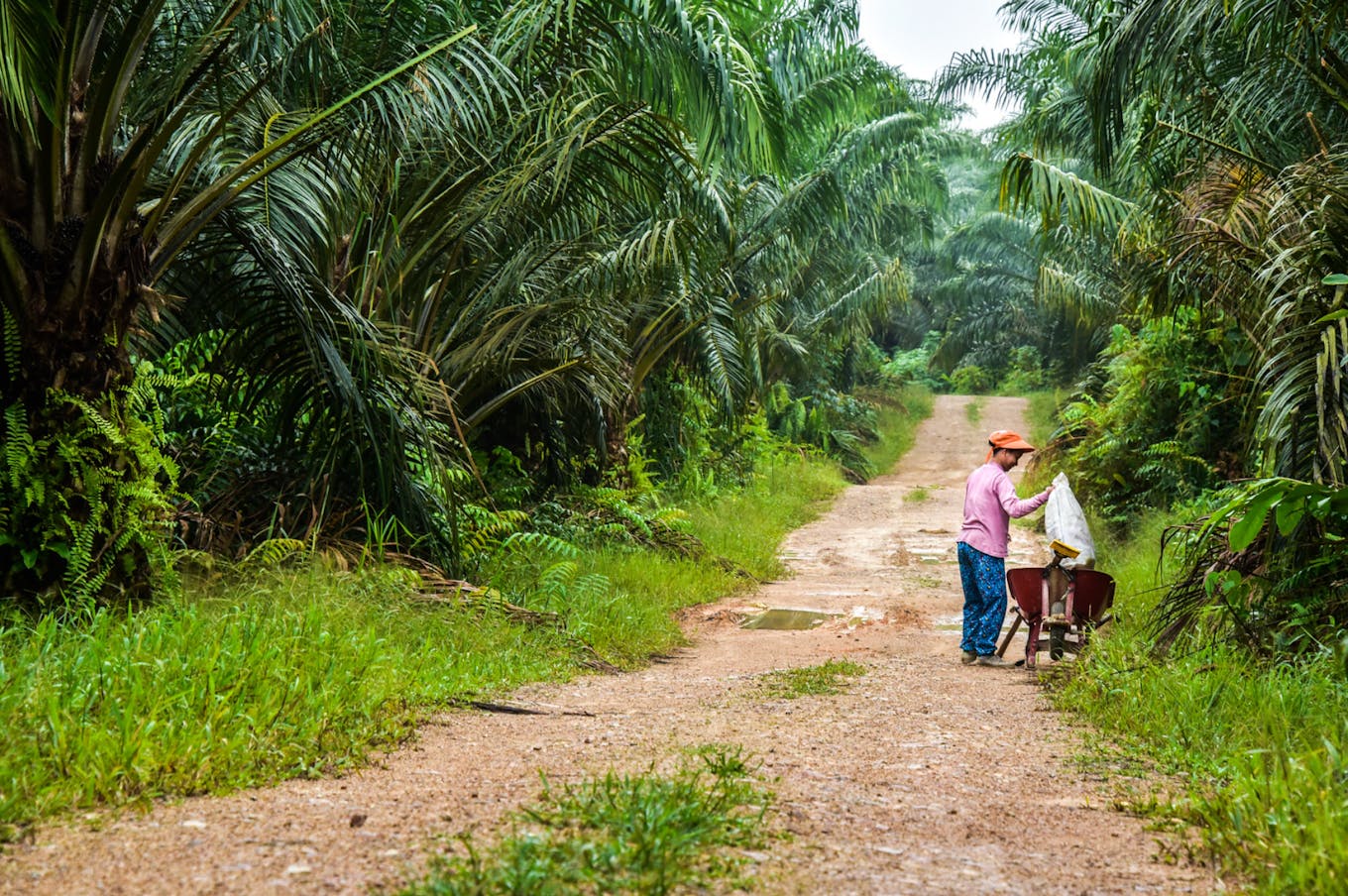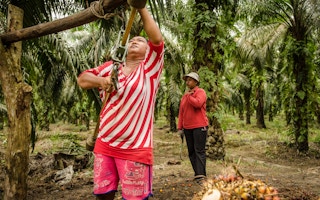Women are often the forgotten link in the sustainable palm oil value chain.
Female oil palm farmers typically work in low-pay jobs, weeding, spraying fertiliser, tending to seedings or collecting loose fruit on plantations in Indonesia, the world’s biggest producer of the edible oil.
According to the International Labour Organisation, less than a third of palm oil workers are female. But data on exactly how many women work in the trade is unreliable, because many women work informally, helping their husbands in the fields, dividing their time between the sweaty labour of plantation life and domestic work at home.
Farm life is hard for women, who work long hours in remote parts of the archipelago, often doing other unpaid work, such as childcare or managing the family warung or store, after spending all day on the plantation.
“Culturally, women are expected to be mothers, not working. But women in smallholder communities must do everything to take care of the family,” said Dr Putri C. Eyanoer, a lecturer at the Universitas Sumatera Utara’s medicine faculty, who consults on a programme to help women smallholders in Indonesia.
NGOs campaign about deforestation and Indigenous peoples affected by the palm oil industry, but rarely the plight of women working on plantations.
Veronica Iswinahyu, Southeast Asian programme manager, Dignity in Work for All
Nutrition deficit
The challenges of working on a plantation are compounded by poor access to healthy, affordable food. Rural parts of Indonesia have long suffered with poor nutrition, and cases of stunting in children are not uncommon.
Dr Fotarisman Zaluchu, who works in the social anthropology department at Universitas Sumatera Utara, warned of non-communicable illnesses such as heart disease and diabetes that could arise from poor nutrition and lifestyle habits. Diets among women smallholders tend to be heavy on rice, salty or fatty foods and sugary drinks, and most struggle to find time for exercise.
“Many women [working on plantations] are more concerned with taking care of oil palm trees rather than their own health. Family is more important to them than anything,” said Dr Fotarisman, who also consults on a health and nutrition programme for independent women smallholders run by palm oil company Musim Mas.
Sri Wahyuni, a farmer who also runs a goods credit business in Riau province in Sumatra, told Eco-Business that she had never visited a doctor before attending Musim Mas’ training programme. Now she goes for health check-ups, exercises regularly and has cut down on sugary tea and stopped cooking with coconut milk, which is high in saturated fat.
Dian Restier, a smallholder who also works as a bank clerk in Riau, has reduced her rice intake and incorporated more fruit and vegetables into her diet, and prepares dinner earlier so that her family can sleep better. Rita Sri Ningsih, a smallholder who typically wakes up at 4am, now starts her day with stretching exercises and regularly goes jogging with her friends.
Musim Mas’ Women Smallholders Programme has trained 500 women in three regencies in the Riau region of Sumatra in nutrition and healthcare since it launched in December 2023. Project leader Linda Wati said health check-ups after a single six-week nutrition and health programme had revealed a marked improvement in blood glucose levels and weight among attendees.
She also noticed a willingness to improve among the participants. “They were so eager to make changes,” said Wati, adding that women had joined chat groups to keep the dialogue going about leading healthy lifestyles.
Gender inequality and plantation culture
Few industries have come under as much scrutiny as palm oil in recent years. But campaigning NGOs have largely overlooked the plight of women smallholders, and have focused on the impact of palm oil on rainforests and Indigenous peoples, says Veronica Iswinahyu, Southeast Asian programme manager, Dignity in Work for All, a non-profit.
Pressure is building on the palm oil sector to focus more on gender equality as it navigates sustainability issues, although instances of palm oil companies being banned from the United States have focused on forced labour rather than the exploitation of women.
Aida Greenbury, senior sustainability advisor for Serikat Petani Kelapa Sawit (SPKS), Indonesia’s independent smallholders union, says that women need to be included in the sustainable palm oil conversation through policies by consumer countries and certification schemes that require the active participation of women – including in decision-making – in supply chains.
Palm oil companies need to do more to include women in their sustainability goals, Greenbury said. “Buying palm oil fruit from smallholders is not enough. [Palm oil companies] need to invest in women and ensure they are treated fairly,” she said.
Gender inclusion can lead to better environmental and social outcomes on plantations, suggested Suksma Ratri, senior communications officer and gender focal point at Solidaridad, a non-profit that works to improve the sustainability of supply chains. As primary caregivers, their greater involvement in decisions would ensure a more “holistic approach” to environmental stewardship, she said.

Women need to be part of the sustainable palm oil conversation, says Aida Greenbury, senior sustainability advisor for Indonesia’s independent smallholders union. Image: CIFOR/Flickr
Education and financial literacy
A key barrier to women’s rights being recognised is education.
Most women smallholders have little more than a primary school education, have limited access to training and skills development compared to men, and have less time to attend courses as they juggle domestic chores. This makes it challenging for them to learn new farming techniques, observes Ratri, whose organisation runs farmer training programmes for women and men called Farmers’ Field School.
A survey of 200 women smallholders conducted last year by Musim Mas, which has trained 43,000 smallholders in sustainable farming techniques since 2015, found that women hope to receive training in financial literacy and entrepreneurship to help them better manage their plantations and expand their home-based businesses.
“Only 10 per cent of women [smallholders are high school graduates. But they have dreams of sending their kids to college. They want to know how to boost the family income to make this happen,” said Dr Putri, who also consults Musim Mas on its training programme for women smallholders.
Musim Mas plans to scale its programme to empower more female smallholders to manage their health and finances better.
“Our vision is to create a model that other companies, governments and NGOs can use too. There are 2.6 million smallholder families in Indonesia. We can’t reach them all on our own.”


















